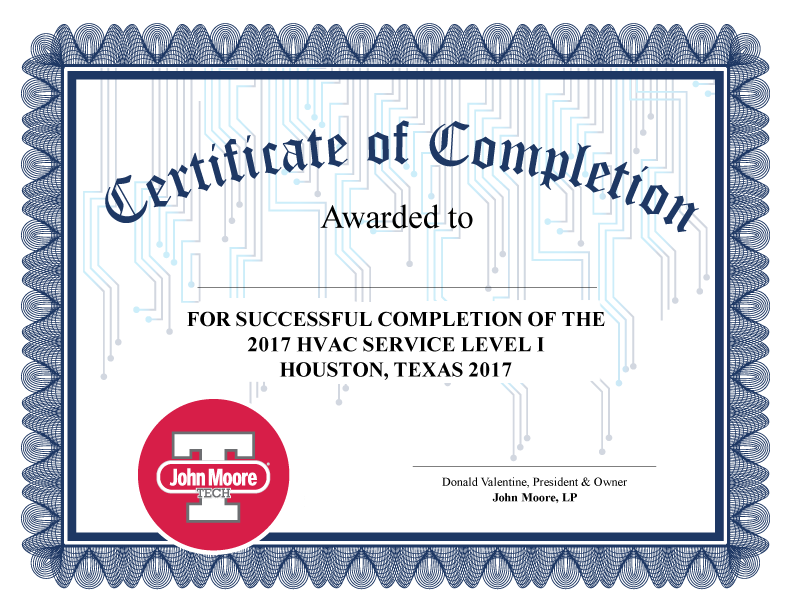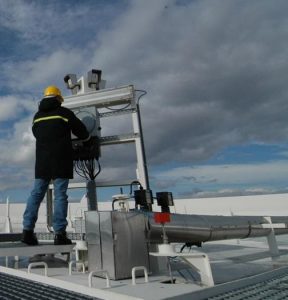“HVAC” stands for heating, ventilation, and air conditioning.
The people responsible for installing, maintaining, and repairing these systems are the HVAC technicians.
Some HVAC technicians may specialize in one field of HVAC or its relevant systems, such as:
- Air conditioning
- Refrigeration
- Radiant heating systems
- Solar panels
- Testing and balancing
When working with HVAC systems, these technicians have to follow government regulations upon handling and disposing of refrigerants.
If this career sounds interesting, read this article to find out more about HVAC technicians and how to become one.
What Is an HVAC Technician?
An HVAC technician installs, cleans, maintains, and repairs the HVAC systems in homes and businesses.
They operate at a high skill level so they can handle electrical circuits, weld pipes, vents, and complex wiring configurations.
Aside from having technical skills, they must also be meticulous and responsible to avoid workplace hazards.
Duties
Typically, an HVAC technician will perform the following:
- Layout and install HVAC wiring
- Oversee installation
- Follow HVAC codes
- Respond to calls and troubleshoot problems
- Provide technical support
- Replace and repair parts that are worn out or defective
Other job tasks may be added depending on the technician’s specialization and the work type they’ll accept.
HVAC Technician’s Salary
According to the Bureau of Labor Statistics (BLS), an HVAC technician can earn an average of $48,630 annually as of May 2021.
The table below shows how much salary you can potentially receive based on the percentile wage.
| Percentile | Average Annual Salary |
| 10% | $34,320 |
| 25% | $38,450 |
| 50% | $48,630 |
| 75% | $62,000 |
| 90% | $78,210 |
Salaries vary widely depending on the industry, level of experience, region, and other factors.
The table below is evidence of how much you can take home based on the industry of employment.
| Industry | Average Annual Salary |
| Scheduled Air Transportation | $89,180 |
| Natural Gas Distribution | $86,710 |
| Electric Power Generation, Transmission, and Distribution | $85,970 |
| Aerospace Product and Parts Manufacturing | $85,680 |
| Deep Sea, Coastal, and Great Lakes Water Transportation | $81,050 |
Meanwhile, the table below shows the top paying states for HVAC technicians.
| State | Average Annual Salary |
| District of Columbia | $70,130 |
| Alaska | $70,100 |
| Hawaii | $69,100 |
| New Jersey | $68,460 |
| New York | $66,180 |
Based on these two tables, you can improve your earning potential by…
- Specializing in a sector that offers higher salaries
- Relocating to a top-paying state
Average National Salary: $48,630
Average HVAC Tech Salary by State
| State | Salary |
|---|---|
| Alabama | $48,580 |
| Alaska | $70,100 |
| Arizona | $50,420 |
| Arkansas | $41,880 |
| California | $61,670 |
| Colorado | $57,490 |
| Connecticut | $64,540 |
| Delaware | $55,170 |
| Florida | $46,850 |
| Georgia | $49,110 |
| Hawaii | $69,100 |
| Idaho | $46,250 |
| Illinois | $57,460 |
| Indiana | $52,470 |
| Iowa | $53,560 |
| Kansas | $51,270 |
| Kentucky | $50,470 |
| Louisiana | $51,100 |
| Maine | $52,050 |
| Maryland | $63,420 |
| Massachusetts | $65,460 |
| Michigan | $54,570 |
| Minnesota | $64,180 |
| Mississippi | $42,690 |
| Missouri | $52,920 |
| Montana | $52,250 |
| Nebraska | $50,790 |
| Nevada | $58,870 |
| New Hampshire | $59,960 |
| New Jersey | $68,460 |
| New Mexico | $48,060 |
| New York | $66,180 |
| North Carolina | $47,570 |
| North Dakota | $63,830 |
| Ohio | $52,710 |
| Oklahoma | $48,770 |
| Oregon | $56,550 |
| Pennsylvania | $53,840 |
| Rhode Island | $63,490 |
| South Carolina | $44,130 |
| South Dakota | $48,400 |
| Tennessee | $47,140 |
| Texas | $51,270 |
| Utah | $50,320 |
| Vermont | $55,220 |
| Virginia | $53,460 |
| Washington | $62,310 |
| West Virginia | $44,920 |
| Wisconsin | $59,130 |
| Wyoming | $53,920 |
Steps to Becoming an HVAC Technician
Step 1 Graduate High School
Most trade schools require candidates to possess a high school diploma before admission.
Also, start learning skills relevant to this profession in high school.
Have a basic understanding and foundation on the following topics:
- Computer science
- Mathematics
- Physics
- Metal shop and other shop classes
- Blueprint reading
- Mechanical drawing
- Electronics
- Plumbing
- Electrical work
Step 2 Enroll in an HVAC Training Course
Many HVAC technicians learn the ins and outs of this profession by getting the appropriate training and education.
Usually offered at a technical school or community college, the HVAC program lasts from 6 months to 2 years.
Program completion can earn you a certificate, diploma, or associate’s degree.
Step 3 Do an On-The-Job Training or Apprenticeship
After program completion, HVAC technicians have the option to either do OJT or apprenticeship.
Both cases will allow you to work alongside and under the supervision of experienced technicians.
The difference is that in an apprenticeship…
- You’ll have more comprehensive training lasting 3 to 5 years
- A company, union, or contractor association can sponsor your apprenticeship program
Step 4 Become Certified
The U.S. Environmental Protection Agency (EPA) requires HVAC technicians to be certified in proper refrigerant handling.
So in addition to providing you with proper training and education, schools will also help you prepare for the certification exam.
Education Requirements
To become an HVAC technician, you will need a post-secondary certification or diploma.
The curriculum varies on the school’s program, but HVAC training typically includes the following classes:
- Fundamental HVAC maintenance
- HVAC diagnostics
- Basic electricity
- Duct and envelope tightness verifiers
- Domestic appliances
- Air conditioning systems
- Codes and regulation
- System controls
- Gas heating systems
Upon completing all lectures, you’ll be put into an OJT or apprenticeship to practice your skills.
Regarding apprenticeships, trade unions and companies will require you to complete 8,000 to 10,0000 hours of training.
In most cases, apprentices receive a salary for the labor they perform during training.
Video About The Career
Certification Requirements
As mentioned, EPA requires all HVAC technicians to get certified.
EPA has four types of technician certification tests:
- Type I for small appliances
- Type II for high-pressure appliances
- Type III for low-pressure appliances
- Universal for all types of equipment
It is important to mention that only the Type I exam can be taken online.
Note, however, that some states may require you to have a license, so make sure to check with your state.
Certification Example:

Average Training Program Duration: 1-3 Years
Popular Programs
Job Outlook
According to BLS, HVAC technicians have projected employment growth of 5% from 2020 to 2030.
This growth will stem primarily from the development of new commercial and residential buildings.
Computer and electronic-savvy technicians and those who keep up with the latest advancements are expected to attract the best job prospects.
Below are the industries with the highest employment levels for HVAC technicians.
| Industry | Employment | Industry Employment % |
| Building Equipment Contractors | 265,450 | 11.83% |
| Merchant Wholesalers, Durable Goods (4232, 4233, 4235, 4236, 4237, and 4239 only) | 9,620 | 0.70% |
| Direct Selling Establishments | 9,600 | 7.40% |
| Commercial and Industrial Machinery and Equipment (except Automotive and Electronic) Repair and Maintenance | 6,200 | 2.96% |
| Colleges, Universities, and Professional Schools | 5,550 | 0.19% |
Employment Growth Projection: 5%
2019
2029
That's a higher than average projected growth of 19,000.
Should You Become an HVAC Technician?

Overall Satisfaction: Medium
What makes people satisfied with the professional path they choose?
This is a complex question because many factors can determine if a career is fulfilling or not.
The following factors are taken into account to determine the overall satisfaction:
- Salary
- Work environment
- Work-related stress
- Skills
- Personality compatibility
According to CareerExplorer, HVAC technicians rated their career happiness 3 out of 5 stars.
This resulted in them having medium overall job satisfaction, putting them in the bottom 29% of all careers.
Despite this result, we believe that if you’re passionate about your job, it can be a rewarding and lucrative career for you.

Average Salary: Medium
As of May 2021, BLS reported that HVAC technicians earn an average annual salary of $48,630.
For those at the lowest 10%, they can only earn $34,320 at most, while the highest 10% earn at least $78,210.
If you’re an apprentice, your salary will be about half of those paid to experienced technicians.

Job Growth Outlook: High
BLS reported a 5% employment level for HVAC technicians from 2020 to 2030.
The high job growth outlook is mainly because of the growing emphasis on energy efficiency and pollution reduction.
As such, HVAC technicians will experience high work demands for climate-control systems.

Education Duration: 1-3 Years
On average, the HVAC program length will run from 6 months to 2 years.
If you choose to become an apprentice over being an OJT trainee, then you’ll have an additional 3 to 5 years.

Personal Skills Needed
To be able to perform well at your job, you will need many skills besides technical abilities:
- Customer-service skills
- Math skills
- Attention to detail
- Physical strength and stamina
- Time management skills
- Troubleshooting skills
- Mechanical skills
Frequently Asked Questions
Q. What Does an HVAC Technician Do?
An HVAC technician is usually responsible for the following
- Installing, cleaning, and maintaining HVAC systems
- Installing electrical components and wiring
- Discussing system malfunctions and explaining solutions to clients
- Inspecting and testing HVAC systems and components
- Replacing and repairing worn-out parts
- Keeping records of work performed
Q. How Much Training Do I Need as an HVAC Technician?
Getting the appropriate training and certification can typically take you, on average, 1 to 3 years.
If you want more comprehensive training in learning the trade, going for an apprenticeship can add up to 5 years.
Q. How Much Does It Cost to Become an HVAC Technician?
Training costs vary depending on the program you choose.
For trade schools, HVAC programs usually cost tuition between $2,000 and $10,000.
Meanwhile, community colleges can be anywhere from around $5,000 to $10,000 a year.
In-state students can be eligible for lower tuition rates and scholarships.
Q. What Is the Demand for HVAC Technicians?
To reiterate, there will be a high demand for HVAC technicians over this decade.
There are two main reasons for that:
- Commercial and residential building construction will help open new jobs
- The growing need for climate-control systems from highly-qualified HVAC technicians
Of course, this goes without saying that the usual services for HVAC systems are open all year round.
And so, most HVAC technicians won’t go without work for long periods.
 HVAC Technician Training Schools by State
HVAC Technician Training Schools by State

- Alabama
- Alaska
- Arizona
- Arkansas
- California
- Colorado
- Connecticut
- Delaware
- Florida
- Georgia
- Hawaii
- Idaho
- Illinois
- Indiana
- Iowa
- Kansas
- Kentucky
- Louisiana
- Maine
- Maryland
- Massachusetts
- Michigan
- Minnesota
- Mississippi
- Missouri
- Montana
- Nebraska
- Nevada
- New Hampshire
- New Jersey
- New Mexico
- New York
- North Carolina
- North Dakota
- Ohio
- Oklahoma
- Oregon
- Pennsylvania
- Rhode Island
- South Carolina
- South Dakota
- Tennessee
- Texas
- Utah
- Vermont
- Virginia
- Washington
- West Virginia
- Wisconsin
- Wyoming






